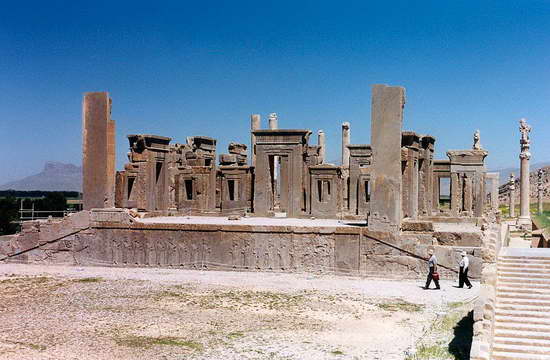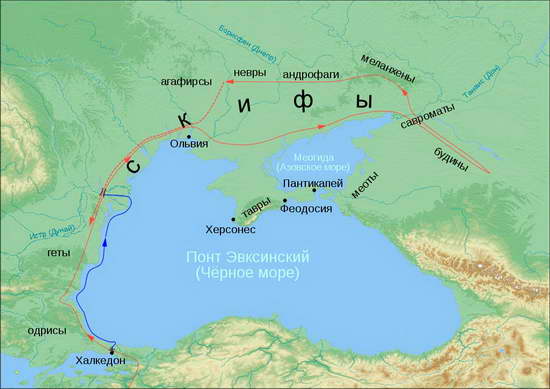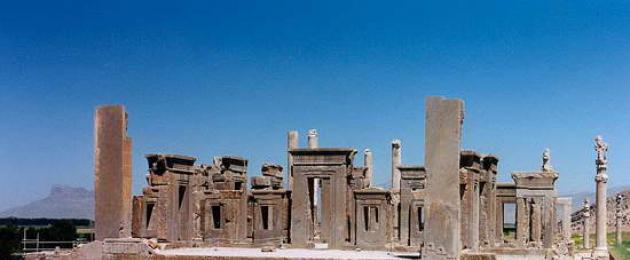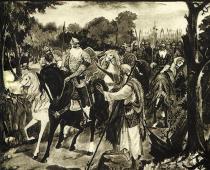After the death of the conqueror of Egypt, the king Cambyses, the Persian throne was seized by an impostor magician Gaumata. He impersonated Smerdis, the brother of Cambyses, whom Cambyses had earlier ordered to be put to death. The identity of the new ruler aroused suspicion among the aristocracy. noble Persian Otan, father-in-law of the late Cambyses, instructed his daughter Fedime, inherited by False Merdis-Gaumata, to make sure who exactly this king is: a deceiver or really the brother of Cambyses. To do this, he ordered her, during the king's sleep in her half, to examine his ears. Fulfilling her father's wish, Fedima announced to him that the king's ears had been cut off. Otan knew that this shameful punishment, under the late founder of Persian power, Cyrus, was subjected to one of his magicians.
The evidence was there. Cambyses' father-in-law told his friends Aspadin And Gabriato, more nobles joined them: Intafern, Megabyz, Hydarn and a member just arrived in Susa Achaemenid dynasty, son of Hystaspes (Vishtaspa) - Darius. These seven conspirators decided to overthrow the impostor, in which Prexaspes helped them a lot, now spreading the rumor among the people that the king was none other than a magician, and, moreover, not a Persian, but a Mede. The conspirators entered the palace, stabbed the eunuchs devoted to the impostor, and reached the halls of the impostor and his brother. Both, after a desperate resistance, were killed, their heads were cut off and displayed to the people. Regardless of this just punishment, those who overthrew the impostor killed all the magicians they could find in the palace and in the city. Subsequently, this day was celebrated with a special celebration called: beating magicians(magophony). On this day, none of this caste dared to appear on the street.
The triumph of Darius I over the magician Gaumata and the rebellious rulers of the regions. Image from the Behistun relief
Having destroyed the impostor and exterminated his adherents, the conspirators proceeded to the important question of establishing a new government. Otan proposed a democratic republic, i.e., people's government; Megabiz - oligarchy; Darius stood for autocracy. The latter opinion prevailed, and Otan immediately renounced all claims to the throne, with the only condition that he and his entire family remain free. They decided to elect a new king from among the six remaining liberators of Persia - by casting lots, and concluded an agreement that the associates of the chosen one would remain with him the first nobles with the right of unrestricted, at any time, entry into the royal palaces. The lot was that the king of the six applicants would be the one whose horse was the first to neigh at sunrise. With the help of his groom evareta(hiding a mare in the bushes near the assembly place), Darius made his horse neigh before the others - and from the saddle he moved to the Persian royal throne. When choosing horse, as an instrument of fate, Darius and his comrades were guided by a religious idea, since the horse, among the ancient Persians, was dedicated to the sun and was revered in the religion of Zoroaster as a sacred animal.
Darius I, the son of Hystaspes, reigned in 521 BC. Descended from the royal family of the Achaemenids, he, in order to better consolidate his power, became even more closely related to the royal house, taking as his wife two daughters of Cyrus, his granddaughter, the daughter of the real Smerdis , and the daughter of Otan - the main culprit of his accession. Darius I divided the Persian kingdom into twenty satrapy, having overlaid them with the correct monetary taxes, which, in previous reigns, were brought, as needed, in money or in kind. As a result of this measure, the Persians developed a proverb cited by Herodotus: Darius is a merchant, Cambyses is a ruler, Cyrus is a father. The state income of Persia under Darius was 14,560 talents.

Ruins of the palace of Darius I in Persepolis
Burdened by the guardianship of his former accomplices, Darius I, under a plausible pretext, executed one of them - Intapherna- and with him several of his relatives. Historians have preserved for us the legend of the unfortunate wife, who begged the king to spare those sentenced to death. Touched, Darius decided to pardon only one, of her choice; she had to choose between her husband, children and brother. She pointed to the latter, saying to the king: I can find another husband, from whom I can have more children, but I can’t find another brother! The king gave her, along with his brother, the eldest son, but executed the rest.
In the third year of the reign of Darius I - or in the second, according to Jewish books - the enemies of the Jews, the Samaritans, informed him that the Jews, despite the prohibition of False Smerdis, continue to rebuild Jerusalem destroyed by Nebuchadnezzar, referring to the ancient decree of Cyrus. Darius confirmed this decree, allowing the Jews to complete the construction, in addition to the city, and the Temple, paying the next taxes to the treasury for expenses.
In 516 BC (fifth year of the reign of Darius), a rebellion broke out in Babylon, in which the insurgents, having locked themselves in the city, prepared for a desperate defense. For nineteen months the Persian king unsuccessfully besieged the rebellious capital, which he nevertheless captured, thanks to cunning and deceit Zopira, the son of Megabyz, who played the same joke with the Babylonians that he played under Cyrus - Arasp. Zopyrus shaved his head, cut off his nose and ears, and handed himself over to the Babylonians, as if to avenge Darius, who mutilated him; he crept into their power of attorney, led them against his own, took part in attacks in which he himself slaughtered the Persians mercilessly. He finally achieved that the Babylonians entrusted him with the protection of the entire city, which Zopyrus betrayed from hand to hand to the king of Persia - for which he slandered himself and was mutilated in such a terrible way. For the second time, violent Babylon fell before Persian weapons, and this time more shameful than the first: Darius I ordered the destruction of its walls, the removal of the city gates and the execution of three thousand noble citizens.
Having pacified the rebellions, King Darius carved on high rocks a solemn story about his accomplishments, decorated with magnificent reliefs (see the Behistun inscription). After that, following the example of Cambyses, who unsuccessfully went to war in Ethiopia, he decided to fight the Scythians , desiring to punish them for their invasion of Media a hundred and twenty years ago. In vain brother Artaban rejected Darius from a reckless intention - the king persisted and actively engaged in preparations for the campaign. He marked his speech with one of those brutal feats for which Cambyses was so inventive. Evaz, a noble Persian, begged the king not to take away all three sons from him for a campaign in Scythia and leave him at least one.
- I'll leave you all! - answered Darius - and really left, executing all three sons.
Numerous troops of Darius I, according to the route drawn up by the king, went to the shores of the Thracian Bosphorus (for more details, see the article Darius I's Campaign against the Scythians). Here the Persians erected a monument with the number of their troops, which, in addition to the crew of 600 ships, up to 700,000 infantry and cavalry. Having crossed the Bosphorus, by means of a pontoon bridge, King Darius led the Persian soldiers through Thrace and the land of the Getae (Dacians), who had been subjugated by him in passing. Reaching the shores Istra(Danube), Darius I sent troops to the opposite bank, ordering his allies, the Greeks of Asia Minor Ionia, to dismantle the bridge they had built and follow him, but changed his mind, on the advice Koeta, the leader of the Mytilenes, and postponed the drawing of the bridge for sixty days, ordering the Greeks to return home, without him, if he did not return to the coast from the interior of the country by that date.
Avoiding clashes with the conqueror, the Scythians, retreating before him, lured him away from the coast, destroying supplies everywhere and thus making the Persians' return journey extremely difficult. Darius camped, which soon began a severe famine. Then the Scythian leaders sent ambassadors to him, who, having handed the king five arrows, a bird, a mouse and a frog, returned to their place without any explanation. Darius I interpreted these strange gifts of the Scythians to himself as an expression of their humility; but one of his companions, Gabriat, explained these symbols differently; according to him, the Scythians wanted to tell the king: burrow into the ground like a mouse, fly away like a bird, hide in the swamp like a frog, everywhere the Scythian arrows will overtake you!

The proposed route of the Scythian campaign of Darius I
Famine and disease in the camp finally forced Darius to retreat. At night, inhumanly leaving the sick and wounded, he shamefully fled to the banks of the Istra, where the Scythian squads had arrived before him. The latter offered the Ionians to dismantle the bridge to the other side and thereby cut off the further retreat of the Persian king. The ruler of Thracian Chersonesus, the Athenian Miltiades, advised the Greeks to fulfill the desire of the Scythians and destroy Darius ... They, it was, agreed - but they were dissuaded by one of the leaders, Histia, tyrant of Miles. In order to avoid disputes with the Scythians, the Greeks dismantled part of the bridge - but as soon as the enemies left to search for the Persian king, Darius I came to the bank of the Istra by another way and crossed with the troops to the opposite side of the river. Leaving, under the command of Megabyzus, 80,000 troops in Chersonese, Darius with the rest of the troops went to Sardis, where he spent the winter. Megabyzus, meanwhile, subjugated to the Persian state all the peoples of the Hellespont, among other countries and Macedonia, where the envoys of Megabyzus, for their impudence and insulting wives and maidens, were cut. - Soon the Scythians devastated Thrace, taking advantage of the absence of Darius, who conquered India this time . Herodotus, mentioning this important event (book IV ch. 44), however, is silent about the details of the campaign of the Persian king in this great country.
- In contact with 0
- Google+ 0
- OK 0
- Facebook 0








